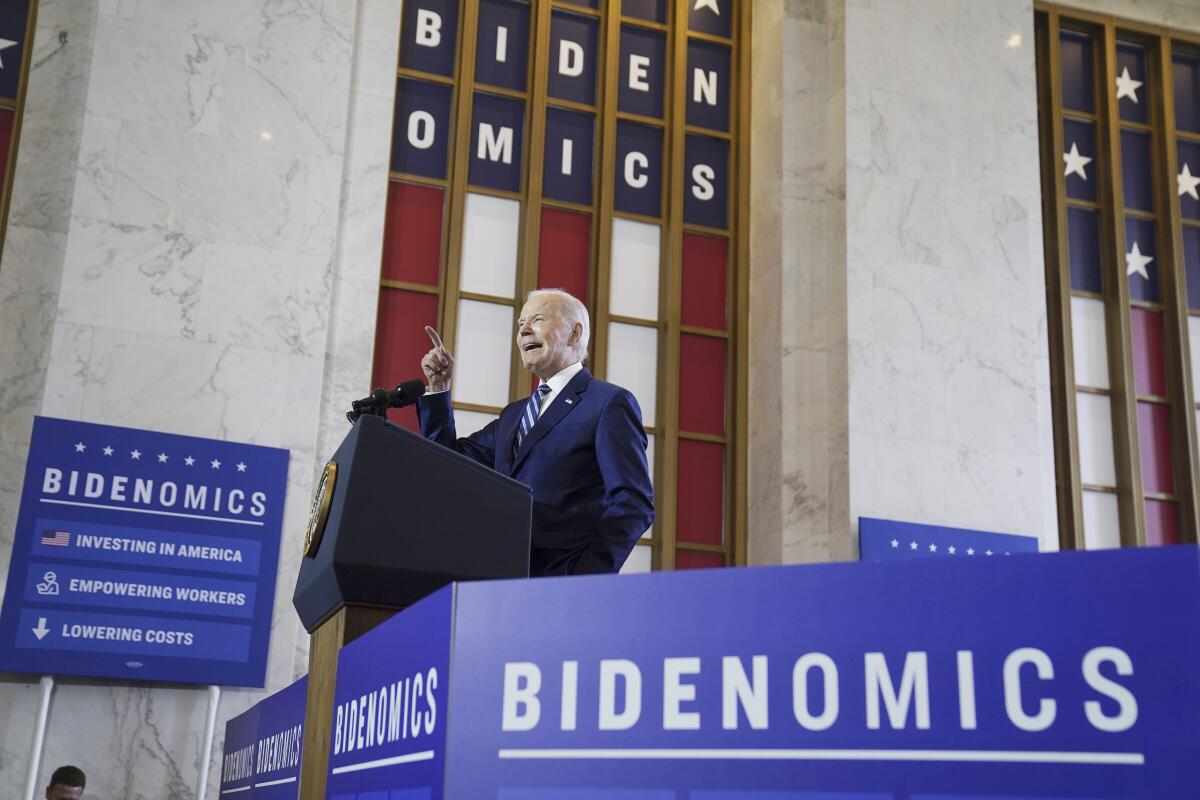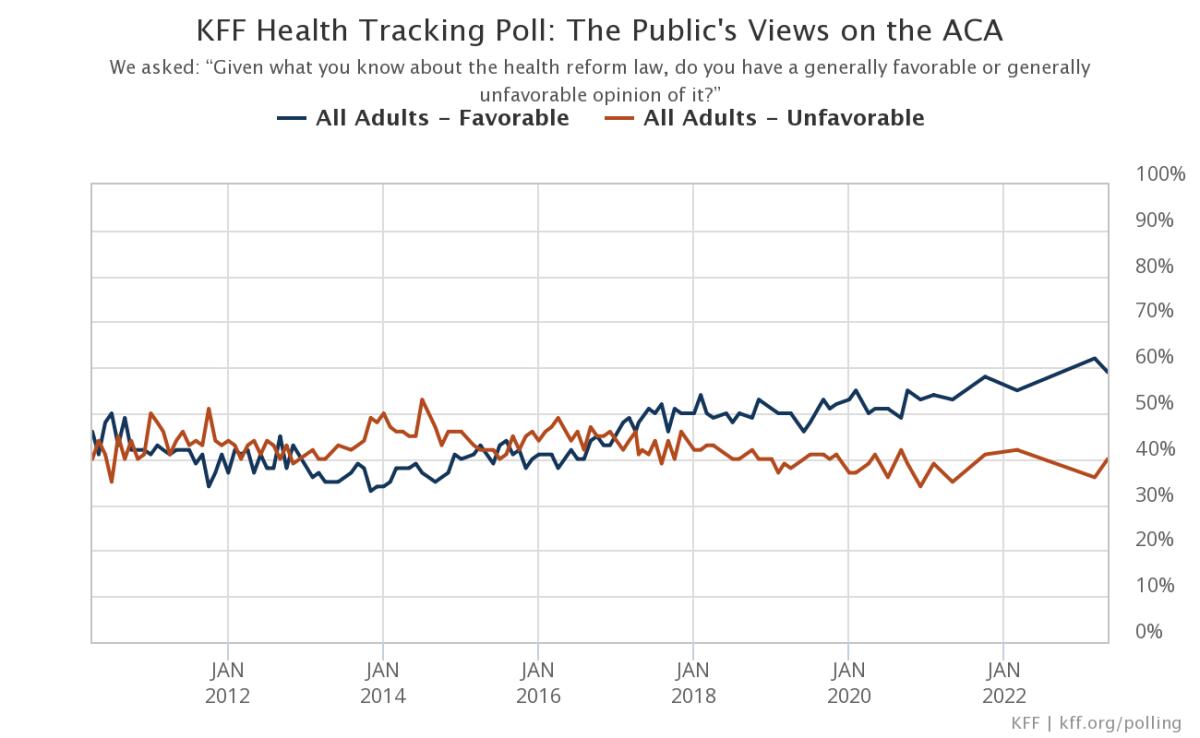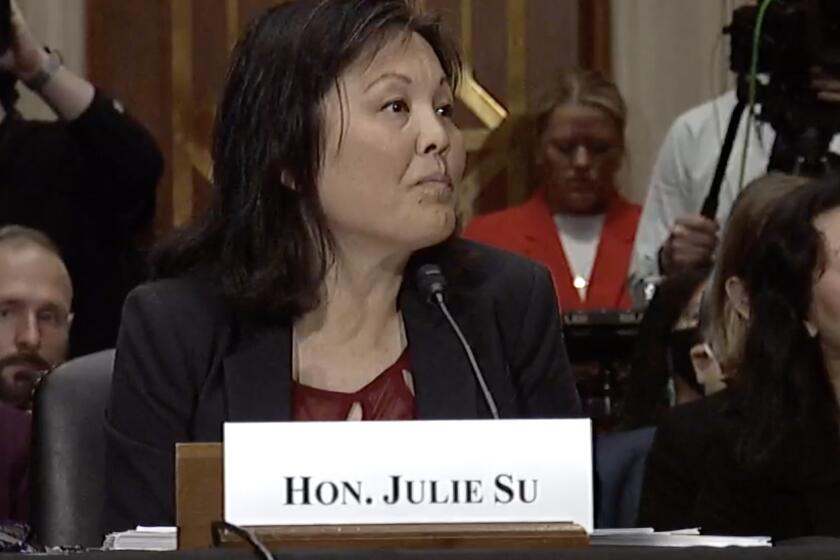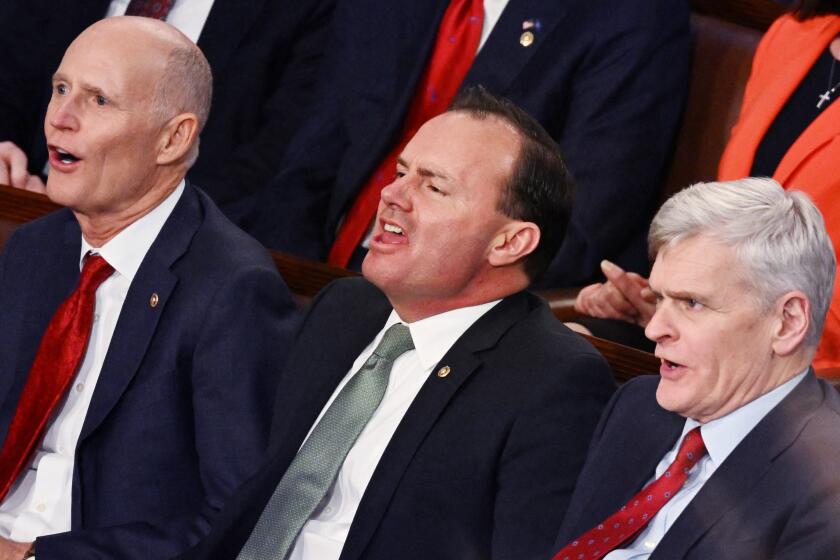Bidenomics has been a boon for working-class voters. Why don’t they give him credit?

- Share via
No one doubts that the fiscal buzzword of the moment is “Bidenomics.” The question at hand is whether President Biden will be able to wear it proudly as a badge, or his Republican adversaries will hang it around his neck like an albatross.
Biden himself plainly sees it as a net positive. During his appearance in Chicago on June 28 to talk up his economic message, the term was emblazoned on the podium and on bunting draped around the hall.
Republicans inevitably see it as just the opposite. “Highest inflation in 40 years. 24 straight months of pay cuts. 37.2% increase in energy prices. That’s Bidenomics in action,” Sen. Marsha Blackburn (R-Tenn.) tweeted that same day.
President Biden has amassed a historic record in his first term. Why aren’t he and his party bragging about it?
— Michael Tomasky, the New Republic
“Savings, real wages and economic confidence are all down while prices continue to skyrocket, and hardworking Americans pay the price for failed ‘Bidenomics,’” chimed in Republican National Committee Chair Ronna Romney McDaniel.
So which is it? The truth is that by most objective measures Biden’s economic policies have been yielding sustained economic growth, including an annualized gain of 2% after inflation in the first quarter of this year, fueled largely by strong exports and consumer spending.
Get the latest from Michael Hiltzik
Commentary on economics and more from a Pulitzer Prize winner.
You may occasionally receive promotional content from the Los Angeles Times.
Inflation has come down sharply. The 40-year peak that Blackburn referenced occurred more than a year ago, in June 2022. Since then the year-over-year inflation rate has been cut by more than half, to 4%. The most recent monthly rate of 0.1% in May points to an annualized inflation rate a bit over 1.2%, well below the Federal Reserve Board’s target of 2%.
Energy prices? They came down by 20% in May compared with a year earlier. Fuel oil prices fell by more than 37% and gasoline by 19.7% in the same period. This month has seen further declines, with the average price per gallon down to $3.54, according to the AAA, a drop of 29.6% from the peak of $5.03 last June.
Lower-income workers were the chief beneficiaries of Biden policies and the general economic environment in recent years. Those earning an average of $12.50 an hour recorded a gain of 6% after inflation from 2020 through 2022, Politico’s Victoria Guida reports.
According to a recent paper by economists David Autor of MIT and Arindrajit Dube and Annie McGrew of the University of Massachusetts, lower-income workers have recovered about 25% of the increase in wage inequality experienced over the last four decades. That’s partially the result of a dramatic restructuring of labor-management relations in the pandemic era, as workers found it easier to quit and find new jobs than they had in years.
Julie Su’s accomplishments make her a spectacularly qualified nominee for Labor secretary. That’s exactly why Republicans — and some Democrats — will do their best to block her confirmation.
Biden’s pro-labor policies may have had something to do with the improvement in workers’ fortunes. Under Biden, the National Labor Relations Board has reversed its hard-bitten pro-management slant under President Trump.
Even Biden’s momentary bow to railroad bosses during the holiday season last year, when he imposed a contract settlement that shortchanged workers on sick days, has been reversed since then, with the railroad unions obtaining the paid sick days they were originally denied.
Administration pressure made a big difference. “The Biden administration played the long game on sick days and stuck with us for months ... without making a big show of it,” Al Russo, the head of the railroad department of the International Brotherhood of Electrical Workers, said June 20, when the deal was reached with four major rail lines.
As for McDaniel’s assertions, Timothy Noah of the New Republic points out that Americans’ saving rate has actually been rising for most of this year. Wages are down when inflation is factored in, but then again inflation is falling. And contrary to McDaniel, economic confidence has been surging, both as an assessment of current conditions and expectations for the future. That’s according to the Conference Board, which keeps the numbers.
Its consumer confidence index was up sharply in June to its highest level in a year, “reflecting improved current conditions and a pop in expectations,” said Dana Peterson, the board’s chief economist.
The stock market has also signaled increasing confidence that the economy will be able to avert a recession despite the Federal Reserve’s battle against inflation, which encompassed the sharpest increase in interest rates in history. Since Election Day 2020, when Biden defeated Trump, the Dow Jones industrial average has risen by almost 25% and the broader Standard & Poor’s 500 index by 32%. That’s despite a painful downturn in the S&P 500 of 23% last year (adjusted for inflation).
A prostate cancer drug developed at UCLA with federal funds costs more than three times as much in the U.S. as anywhere else. President Biden could have forced a price cut but didn’t.
It’s fair to say that the economy hasn’t yet recovered the strength it needs to produce the tide that lifts all boats. Many Americans still feel the pain of higher prices and narrowed employment opportunity; where one stands on the economy depends as much as always on where one sits.
But generally speaking, Biden’s approach to economic policy has been to push it in the direction of favoring ordinary Americans through initiatives such as infrastructure spending, regulatory policies and the effort to reduce the burden of student debt (blocked by a far-right Supreme Court). That’s a big change from the Trump years, when the GOP’s most significant legislative achievement was an enormous tax cut for corporations and the wealthy.
Despite all that, opinion polls still show that Biden gets low marks for his management of the economy. There are a few reasons for that.
An established truism regarding voters’ opinions about the economy is that they lag well behind reality, especially when the reality is a recovery from a slump. People will typically think that a recession is still in full flood long after conditions have turned higher.

One reason may be that bad news sells better than good news. Marketers of economic nostrums such as cryptocurrency and gold investments don’t win customers by proclaiming that happy days are here again.
They do so by offering remedies for the dark days that are supposedly here and are only going to get worse. Surely it’s no coincidence that these investment trapdoors are advertised by right-wing websites featuring apocalyptic screeds and pitched by the likes of Sean Hannity and Tucker Carlson.
Opposition politicians, always on the lookout for issues to run on, also strive invariably to paint the economic picture in the darkest hues, typically by pointing fingers at the incumbent party and president.
One can’t reproach them for blaming Biden for economic circumstances that are truly out of his control — such as the supply chain logjams and Russian invasion of Ukraine, which triggered inflation a year ago — any more than one can reproach a dog for drinking out of the toilet. It’s natural behavior, of which Democrats are just as guilty when they’re out of office. One can only point out that the economic boons that GOP politicians are taking credit for are the result of policies they tried to kill.
In recent weeks, for example, Republican senators and representatives were out and about associating themselves with federally funded infrastructure projects in their constituencies.
Republicans say Biden is lying about their intention to cut Social Security and Medicare. The evidence backs him up.
Sen. Tommy Tuberville of Alabama crowed about the “crucial funds” ($1.4 billion) he had helped his state secure for broadband access. Blackburn celebrated the progress her state of Tennessee had “made in expanding broadband.” Sen. John Cornyn of Texas announced a $3.3-billion grant to his home state for the same purpose.
You can probably see the punchline coming a mile away: Every one of them voted against the infrastructure bill that appropriated the money. In the House, the measure passed with two GOP yea votes and 201 against; in the Senate, 19 Republicans voted for the measure and 30, including Tuberville, Blackburn and Cornyn, voted no.
Biden has been appropriately wry about the Republicans’ touting the effects of measures they tried to kill. “Tuberville,” he said at a June 28 appearance in Chicago to talk up Bidenomics, “strongly opposed the legislation that now he’s hailing. ... He says, ‘Great to see Alabama receive critical funds to boost ongoing broadband efforts.’ End of quote. I told him I’ll see him at the groundbreaking.”
One doesn’t need to go too far back in history to find parallels for the majestic dishonesty of the GOP campaign on the Biden economy. In 2009, scores of Republican lawmakers jostled to take maximal credit for post-recession recovery grants flowing into their districts as a result of a stimulus measure that had passed the House without a single GOP vote and the Senate with only three GOP votes.
Another factor may be Republicans’ skills at crafting talking points, one area in which their superiority to Democrats is indisputable. “Democrats, Wake the Hell Up!” New Republic editor Michael Tomasky urged recently. “President Biden has amassed a historic record in his first term. Why aren’t he and his party bragging about it?”
Accepting the label of Bidenomics for economic policies may be a political risk for Biden. But it may be an encouraging sign that he’s leaning into a label that the GOP has tried to turn into a dirty word, since he does have a lot to brag about. It should be remembered that the Republicans tried to turn public discontent with the Affordable Care Act into a millstone for Democrats by calling it “Obamacare.”
Over time, however, Obamacare became a blessing, not a curse. In its most recent tracking poll on the Affordable Care Act, the Kaiser Family Foundation determined that Americans now have a favorable view of the program by a 60%-40% margin, its best showing ever. That should make Democrats optimistic that the virtues of their policies get recognized by voters eventually, but pessimistic over the fact that it took the ACA, which was enacted in 2010, some 13 years to reach that promised land.
More to Read
Get the latest from Michael Hiltzik
Commentary on economics and more from a Pulitzer Prize winner.
You may occasionally receive promotional content from the Los Angeles Times.














